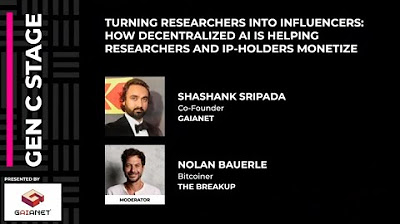Principle 5 Privacy
Summary
TLDRThis script discusses the critical principle of privacy in blockchain technology, emphasizing the importance of individuals controlling their own data. It highlights the issue of central databases accumulating personal information without consent and the potential for misuse. Blockchain's ability to separate identity from transactions offers a solution, allowing users to maintain anonymity and choose their level of privacy. The script also touches on the balance between individual privacy and organizational transparency, suggesting that blockchain can help counteract the growing surveillance society and protect personal data.
Takeaways
- 🔒 Privacy is a fundamental human right and a cornerstone of free societies, emphasizing the importance of individuals controlling their own data.
- 🌐 The internet has led to the accumulation of vast amounts of personal data, often without individuals' knowledge or consent, creating a digital 'virtual you'.
- 🕵️♂️ Blockchain technology, by design, eliminates the need to know true identities for transactions, enhancing privacy by separating identity from transactions.
- 💡 Satoshi Nakamoto's creation of Bitcoin blockchain did not require identity information, setting a precedent for anonymous yet verifiable transactions.
- 🏦 Traditional financial systems like SWIFT and credit cards are identity-centric, increasing the risk of personal data breaches.
- 🔑 Blockchain allows for pseudonymous transactions, where users can maintain anonymity without attaching personal details to their identity.
- 🔄 The separation of identification and verification from the transaction layer in blockchain helps prevent the creation of 'honeypots' of personal data.
- 📈 The scale of data breaches in recent years is enormous, affecting millions of people and highlighting the vulnerability of centralized data storage.
- 🌍 Blockchain protocols offer customizable privacy levels, enabling users to manage their identities and decide how much information to reveal.
- 🏛️ The potential for both privacy and transparency in blockchain applications can build trust in organizations and institutions.
- 🛡️ Blockchain provides a defense against surveillance and the misuse of personal data, giving individuals more control over their digital footprints.
Q & A
What is the fifth principle of blockchain design mentioned in the script?
-The fifth principle of blockchain design mentioned is privacy, emphasizing that people should control and own their own data.
Why is privacy considered a basic human right in the context of the script?
-Privacy is considered a basic human right because it is the foundation of freedom and free societies, allowing individuals to control their personal information and interactions.
How does blockchain technology address the issue of identity and privacy?
-Blockchain technology disentangles identity from transactions, allowing for pseudonymous participation and not requiring personal data for the use of the network.
What is the problem with central databases in terms of privacy?
-Central databases in both public and private sectors can accumulate confidential information about individuals without their knowledge, creating a honeypot of data that is vulnerable to breaches.
What is a 'cyber clone' as mentioned in the script?
-A 'cyber clone' refers to the virtual representation of a person, created by corporations through the collection and analysis of personal data, which may know more about the individual than they do themselves.
How does blockchain technology differ from traditional financial systems like SWIFT in terms of identity requirements?
-Unlike traditional financial systems, blockchain technology does not require identity information for transactions, maintaining a separation between identification and verification layers and the transaction layer.
What are the implications of the blockchain's approach to privacy for individuals?
-The blockchain's approach to privacy allows individuals to maintain personal anonymity, manage their identities, and choose the level of privacy they are comfortable with in any given transaction or environment.
How does blockchain technology help in managing identity and data privacy in transactions?
-Blockchain technology allows participants to provide only the metadata that the recipient needs to know, and enables the use of multiple public-private key sets, complicating the tracing of data back to any one person or institution.
What is the significance of the separation between the transaction layer and the identification and verification layers in blockchain?
-The separation ensures that transactions can occur without revealing the identities of the parties involved, enhancing privacy and reducing the risk of data breaches.
How does blockchain technology offer a defense against surveillance society?
-Blockchain technology provides a way to retain ownership over personal data, allowing individuals to protect their information and only give away what is required in any social or economic exchange.
What is the ideal situation proposed in the script regarding privacy and transparency?
-The ideal situation is privacy for individuals and transparency for organizations and institutions, where stakeholders can agree on the level of transparency that makes sense for their interactions.
Outlines

This section is available to paid users only. Please upgrade to access this part.
Upgrade NowMindmap

This section is available to paid users only. Please upgrade to access this part.
Upgrade NowKeywords

This section is available to paid users only. Please upgrade to access this part.
Upgrade NowHighlights

This section is available to paid users only. Please upgrade to access this part.
Upgrade NowTranscripts

This section is available to paid users only. Please upgrade to access this part.
Upgrade NowBrowse More Related Video

Exploring the Value of Knowledge in Web3 | #Consensus2024 AI Summit Recap

What Is a Blockchain Oracle? What Is the Oracle Problem?

PRINCIPIOS GENERALES DE ÉTICA INFORMÁTICA - GenMed

Building Privacy by Porter, Protocol Security Engineer

Blockchain Hashing Explained! (You NEED to understand this)

Cellphone Surveillance Explained - Stingray/IMSI Catchers
5.0 / 5 (0 votes)